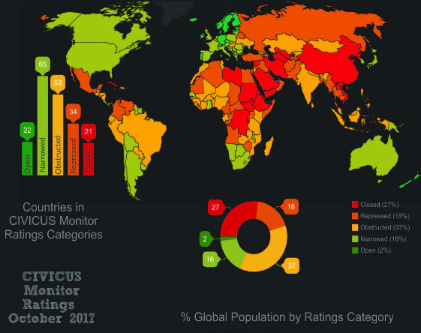
CIVICUS
Civic space—the fundamental liberties that allow people to gather, communicate, and collectively engage in groups to influence society and politics—is the bedrock of any democracy. But it is increasingly vulnerable, Carnegie analyst Saskia Brechenmacher and Thomas Carothers warn. Over the past ten years, more and more governments have tried to restrict civic space in various ways, they write in a new analysis, Defending Civic Space: Is the International Community Stuck?:
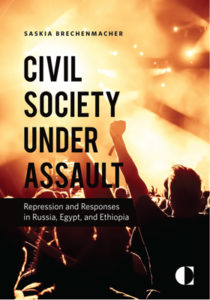 First, governments try to limit civic space by passing laws that tighten control over the activities and funding of civil society organizations, and limit freedom of expression online and offline. Sweeping anti-terror and anti-protest measures, often justified on grounds of national security, also allow state authorities to silence critics….
First, governments try to limit civic space by passing laws that tighten control over the activities and funding of civil society organizations, and limit freedom of expression online and offline. Sweeping anti-terror and anti-protest measures, often justified on grounds of national security, also allow state authorities to silence critics….- Second, governments restrict civic space by attacking the legitimacy of civil society organizations. One particularly popular technique is to accuse non-governmental groups of acting on behalf of shadowy interests or foreign powers, with the aim of sowing public mistrust. This type of rhetoric has spread across borders: it is a convenient trope for dismissing critics.
- Third, state and non-state actors can clamp down on civic activism through direct intimidation, harassment, and violence. Violence is particularly common against protesters, journalists, and environmental activists. In 2018, for example, 164 environmental activists were killed defending their land from industries such as mining, agribusiness, and logging.
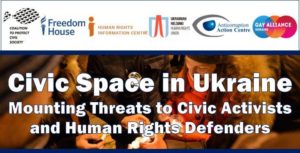 International responses to closing civic space mostly fall into three broad categories, they add:
International responses to closing civic space mostly fall into three broad categories, they add:
- The first is generating research and analysis about the nature of the problem and spreading this knowledge both within organizations supporting civil society and within foreign policy communities more broadly. Public and private research funding has supported many studies of the closing space trend by think tanks and INGOs, as well as numerous workshops and conferences to let concerned actors share perspectives and lessons learned.
- The second category involves helping civic activists and organizations in affected countries fight back against new restrictions and continue their work under more difficult circumstances. Such efforts include emergency funds for activists, support for advocacy work and new protective measures, new funding mechanisms aimed at circumventing restrictions and strengthening local organizations’ resilience, and the establishment of new innovative civil society coalitions at the local, regional, and international levels.
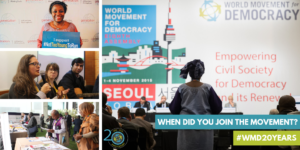 Third, concerned governments and other organizations are pushing back directly by applying diplomatic pressure on repressive governments. Some of these concerned actors are also seeking to influence broader international norms and policies related to civic space, including in the realms of development cooperation and counterterrorism.
Third, concerned governments and other organizations are pushing back directly by applying diplomatic pressure on repressive governments. Some of these concerned actors are also seeking to influence broader international norms and policies related to civic space, including in the realms of development cooperation and counterterrorism.
For example, in terms of supporting active resistance within affected countries, some funders have made new assistance available to help activists in countries with closing space adapt to and/or resist new regulatory, political, and legal pressures, Brechenmacher and Carothers add:
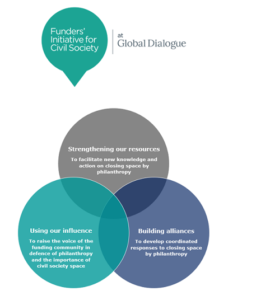 This includes programs to help activists analyze pending measures, learn from the experience of activists in other sectors or countries, form resistance coalitions, and mount advocacy and public awareness campaigns. For example, the Funders’ Initiative for Civil Society (right) and the Fund for Global Human Rights have convened dialogues with civic actors* in selected countries that have experienced or are at risk of civil society restrictions….
This includes programs to help activists analyze pending measures, learn from the experience of activists in other sectors or countries, form resistance coalitions, and mount advocacy and public awareness campaigns. For example, the Funders’ Initiative for Civil Society (right) and the Fund for Global Human Rights have convened dialogues with civic actors* in selected countries that have experienced or are at risk of civil society restrictions….- Funders are also increasingly offering training and protective technologies to improve local organizations’ digital security and help them protect themselves from online surveillance and harassment.
- Some exploratory efforts have focused on helping civic organizations forge new narratives about their work and civic engagement more broadly, so as to counter governmental smear campaigns and public mistrust of civil society.
*Only a genuine dialogue between actors prepared to reconfigure Chile’s underlying structures can provide the new kind of social pact that will lead to a better social, political, and economic future, writes Kirsten Sehnbruch of the LSE International Inequalities Institute. Chile’s recent protests represent the culmination of decades of social upheaval, while the noxious effects of the country’s deep and diverse multidimensional inequalities are both material and intangible, she contends.
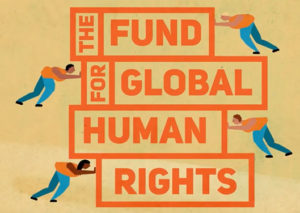 Multiple studies show that civil resistance campaigns are, compared to other means, one of the most powerful drivers of democratic development. Such campaigns are often necessary in order to get weak or corrupted institutions to work again, argues Hardy Merriman, president of the International Center on Nonviolent Conflict (ICNC). But in times of democratic backsliding, we need to ask each other which civil society, and what model of change.
Multiple studies show that civil resistance campaigns are, compared to other means, one of the most powerful drivers of democratic development. Such campaigns are often necessary in order to get weak or corrupted institutions to work again, argues Hardy Merriman, president of the International Center on Nonviolent Conflict (ICNC). But in times of democratic backsliding, we need to ask each other which civil society, and what model of change.
Many aid providers have begun making adaptive changes to funding practices to better help local partners resist and survive, Brechenmacher and Carothers observe:
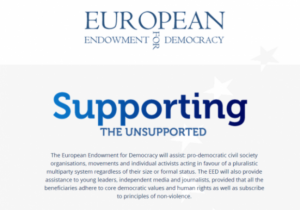 Besieged activists frequently call for more flexible, core support in place of project funding to help them take advantage of sudden opportunities and respond to new threats. Funders often discuss this imperative—sometimes framed as the need for greater local ownership—but still implement it inconsistently. One tangible example is the creation of the European Endowment for Democracy, [consciously modeled on the US-based National Endowment for Democracy] which enjoys greater flexibility than traditional funders in supporting informal groups, movements, and individuals.
Besieged activists frequently call for more flexible, core support in place of project funding to help them take advantage of sudden opportunities and respond to new threats. Funders often discuss this imperative—sometimes framed as the need for greater local ownership—but still implement it inconsistently. One tangible example is the creation of the European Endowment for Democracy, [consciously modeled on the US-based National Endowment for Democracy] which enjoys greater flexibility than traditional funders in supporting informal groups, movements, and individuals.- Some funders are also trying to help civic groups access alternative resources. The United States Agency for International Development (USAID), for example, is supporting the development of local philanthropy in some partner countries and helping civil society organizations use new digital technologies to raise funds through crowdsourcing and other means. RTWT
The International Institute for Democracy and Electoral Assistance seeks a Director of Global Programme. Location Stockholm, Sweden. Full details.







